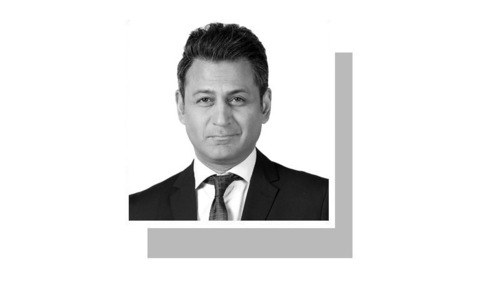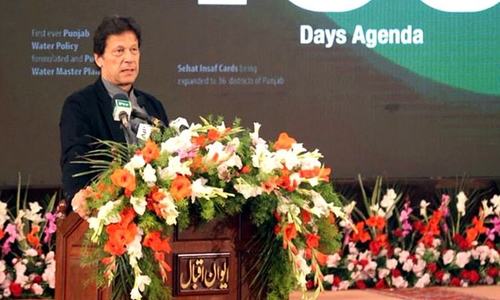THE PTI government completes three years in power this month. At the end of this period, some harsh facts stand out in clear light against the haze of political spin. Here are 10:
The PTI is in its strongest position since 2018. Its elation over victory wore off real quick as the reality of governance smashed into it like a burning meteor. Reeling under the impact of its own inexperience, ineptitude and inability to measure up to the big offices it had inherited, Imran Khan’s party struggled to stay afloat. The establishment’s lifejacket enabled it to keep its head above water, barely, as it lurched from one disastrous policy to another. Today, however, it has seen off most threats and is looking secure and strong. The feeling of security and strength may not last long given the mercurial and event-driven nature of Pakistani politics.
The government faces certain vulnerabilities which could rupture the prevailing perception of strength: (a) the growth budget of Finance Minister Shaukat Tarin could flounder at the rocks of IMF’s conditionalities. Steep utility charges, rising fuel prices and a ballooning current account deficit could all lead to inflationary pressures which would extract a political price so close to the elections; (b) poor governance and weak political management in Punjab can hollow out the PTI’s electoral strength in the province that matters the most. Winning by-elections in Sialkot, Gilgit-Baltistan and Azad Kashmir while controlling the Punjab and federal government may provide illusory confidence but the general elections would pit the Buzdar-scarred PTI in Punjab against the PML-N juggernaut — an uphill climb if ever there was one.
The PML-N is at its weakest since the last elections. It may have lost the 2018 elections comprehensively, but it managed to dilute the impact of this loss through its powerful narrative regarding the unfairness of the result. Nawaz Sharif’s defiance of the powerful establishment, the burgeoning threat of the PDM’s long march and resignations coupled with the fumbling and bumbling performance of the PTI — all these combined to create a perception that PML-N was gaining strength on a daily basis. Today, it is weakened by redundancy of its rigging allegations, confusion over the Nawaz vs Shehbaz narrative, mounting legal threats to most of its important leaders, and a growing perception that it remains unacceptable to the establishment.
Yet, the PML-N is no pushover. Maryam Nawaz’s aggressive politics has galvanised the party support base and her electrifying campaigns have shown that the party is in no mood to roll over and play dead. There is little indication that Nawaz Sharif is open to softening his narrative, which means that he is primed for a fight. This makes him — and his party — unpredictable. And dangerous.
The PPP has improved its political manoeuvrability since 2018 and is today positioning itself confidently for a leap towards power in 2023. Routed in Punjab, burdened with corruption cases and written off as an insignificant national player on the political chessboard, the party today believes it has played smart politics by walking a tightrope between the PTI, PML-N and the establishment. Bilawal Bhutto-Zardari is now touted as an alternative to Prime Minister Imran Khan if the PPP can stitch together a coalition for the next elections and lead it in the centre. This plan envisages a strategic alliance with pro-establishment players that can grab seats in the southern districts of Punjab and bring the coalition tally — including the PPP’s Sindh seats — near 70. Then, the PPP says, it will be in the game.
The current game though is a bit different. The PTI is eyeing Sindh salaciously. It wants to keep the PPP under threat in its home ground. Other than Karachi, the PTI does not have the support base to make grand aspirations. In Karachi too, the seats bonanza it reaped in 2018 looks hard to replicate. The PPP has appointed its rising star Murtaza Wahab as the administrator for Karachi. It wants to spruce up its performance leveraging the power of the provincial government to make electoral inroads into the city. A mini battle is about to start.
The Jehangir Tareen group is now a certifiable player for the 2023 elections. The last 48 hours have helped in defining the group in more adversarial terms for its mothership, the PTI. First, one of its members Nazir Chauhan was pressured by the government into breaking ranks, and then another key Tareen loyalist Aun Chaudhry was forced to resign from his portfolio in the Punjab government. The group boasts impressive numbers and almost all represent electables from Punjab. The Tareen group is today priming for a role as part of a coalition for the next elections. It can play the spoiler for PTI.
The PML-Q has maintained its strength since 2018 and is salivating at the prospect of multiple options opening up for the next elections. Smart politics by the Chaudhries, coupled with the reflected clout of their powerful friends, have ensured that they continue to punch beyond their electoral numbers. If they play their cards right, and fortune favours them, they may aim for a ‘PML-Q Plus’. The PTI’s weak handling of Punjab has opened prospects for other stakeholders.
Maulana Fazlur Rehman has taken a considerable political hit since 2018. The highpoint of his long march to Islamabad is now a distant and hazy memory. With PDM’s inglorious collapse, the JUI-F today is a party faced with shrinking options. An alliance of religious parties is also nowhere on the horizon. A weakened maulana may be plotting his revenge. Don’t hold your breath though.
In this landscape, could Prime Minister Imran Khan go for early elections in 2022? The next few months will determine if the trend holds in favour of the PTI or reverses back to misgovernance. Meanwhile, each party will continue to fight its own demons.
The writer is Dawn’s resident editor in Islamabad.
Twitter: @fahdhusain
Published in Dawn, August 7th, 2021













































